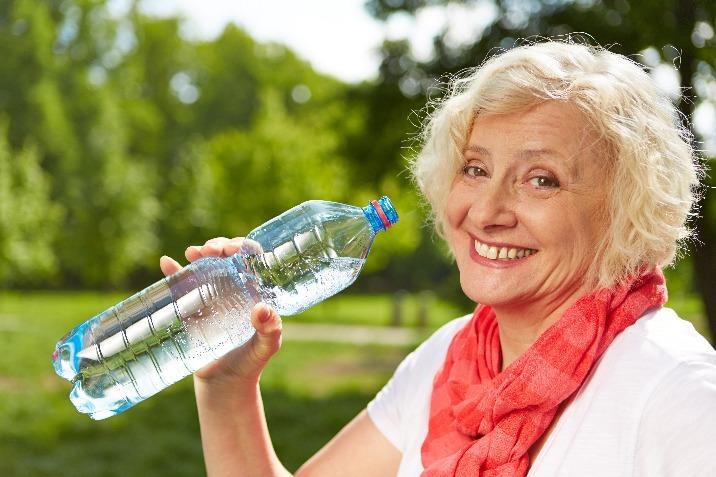Seniors And Summer Heat: Safety Tips For Hot Weather

Summer is a wonderful time of year, full of cookouts, swimming, sunning, and time with family. It can also be dangerously hot. For family caregivers who want to help their senior loved ones have memorable summertime experiences--while also watching out for their health--it can be challenging.
3 Important health and safety tips for seniors this summer:
1. For Seniors, Hydration Is More Important Than Ever
Seniors are more susceptible to dehydration due to natural physiological changes.
By the time we reach 80 years of age, our bodies contain 15% less water than when we were 20 years old. As we age, we naturally lose muscle mass and acquire more fat cells, causing us to retain less of the water we drink. Additionally, our kidneys function less efficiently as we age. We’re also less sensitive to the sensation of thirst. For many seniors, necessary medications increase the risk of dehydration even more.
So what does this mean for seniors during the heat of summer? It means hydration is more important than you may think.
Seniors should drink enough water for their personal weight—about a half ounce to an ounce for each pound. A 130-pound woman, for instance, should drink about 65 ounces of fluids per day. This translates to a little over five 8-ounce glasses of water. Seniors who spend time outside should drink at least the minimum amount of water or more. To manage hydration, drink water for each hour when outside.
Not getting enough fluid intake? Look for signs of dehydration like dry mouth, lack of sweat, dry eyes, troubled speech, or confusion. Leave hot environments and have something to drink immediately if you suspect dehydration.
2. Sunburn: A Bigger Problem Than You May Think
Sun exposure causes more than just premature skin aging. The effects of UV exposure can cause cancerous skin lesions--especially on fair skin. While many seniors aren’t concerned about premature aging, they should absolutely be concerned about the effects of sunburn.
Older skin is, in fact, more susceptible to the effects of sun exposure. In several intriguing studies, older skin is shown to produce less of an immune response to sunburn than younger skin. Older skin is also thinner, has a reduced healing factor and generally has more pre-existing damage than young skin. Additionally, many seniors are required to take medications that make them especially sensitive to the sun.
All of this compounds to make sunburn a serious problem for seniors.
For seniors spending time in the sun this summer, it’s important to make sure to apply sunscreen with an SPF of at least 15 regularly throughout the day. Increase the SPF if spending time in the sun during the hottest part of the day (10 AM–4 PM). If swimming or sweating heavily, re-apply sunscreen more often to prevent sneaky burns.
3. Heat Exhaustion + Heat Stroke
Another big threat to seniors during the summer months is heat exhaustion.
Heat exhaustion is a condition that arises when a person’s internal body temperature reaches around 100°F. Symptoms include rapid pulse, muscle cramps, dizziness, fatigue, and even nausea.
For seniors, heat exhaustion can materialize fast and unexpectedly. Older individuals often have less internal temperature regulation than younger people, caused by a natural increase in fat cells and a decrease in overall sweat produced. Seniors are also more likely to have medical conditions or to be on medications that cause their internal temperatures to be less stable.
Heat exhaustion can transform rapidly to heat stroke if you aren’t vigilant. This is especially true in older people. Between 1999 and 2009, 40% of all heat-related deaths in the United States were individuals over the age of 65.
To prevent heat exhaustion in seniors, make sure to drink plenty of water and wear loose-fitting, breathable clothing when going outside. Cotton, linen, rayon, and seersucker are some of the most breathable fabrics for summertime. Check clothing for breathability and fit before going outside, especially if the temperatures are 90°F or higher.
Seeking home care for a senior? Contact Visiting Angels today.
